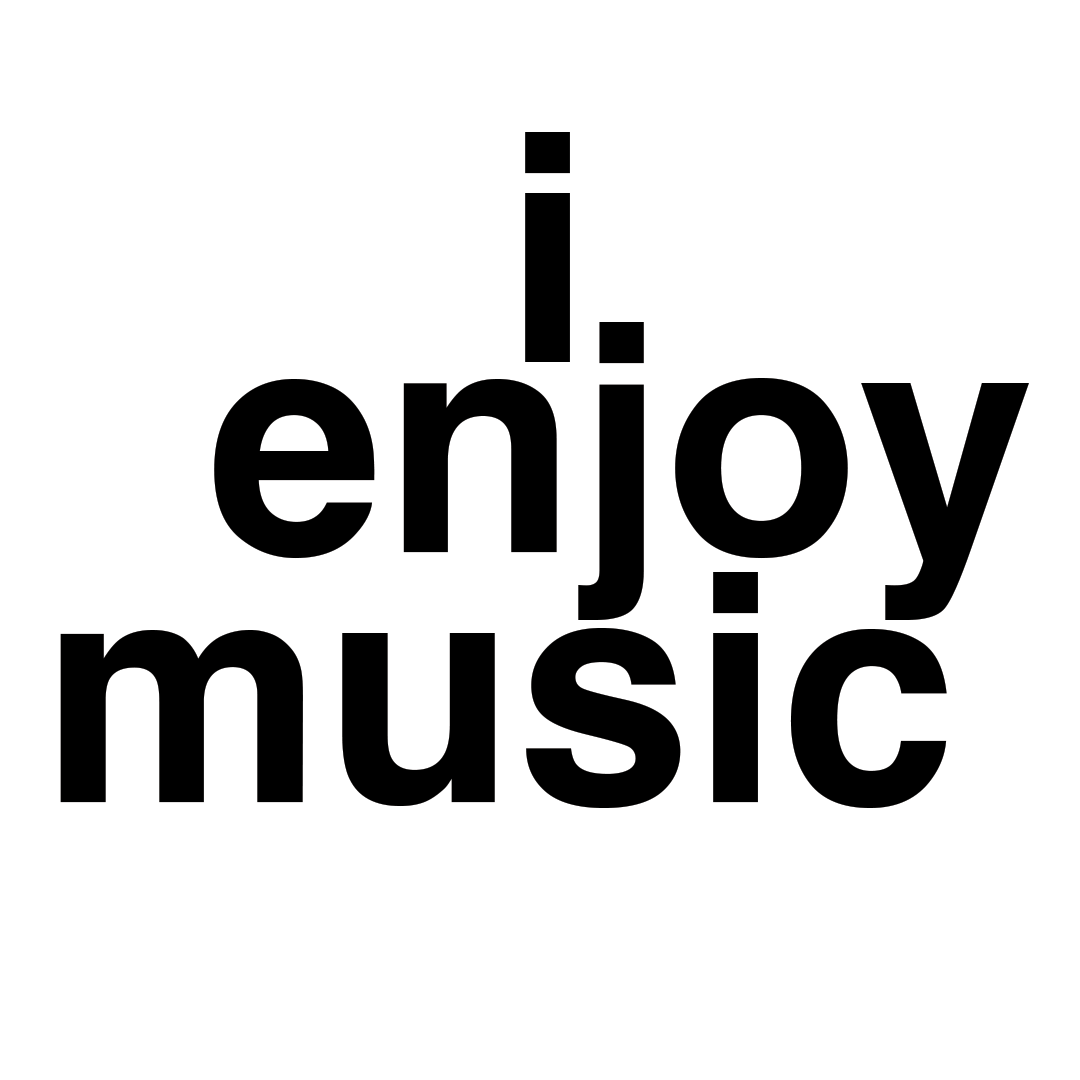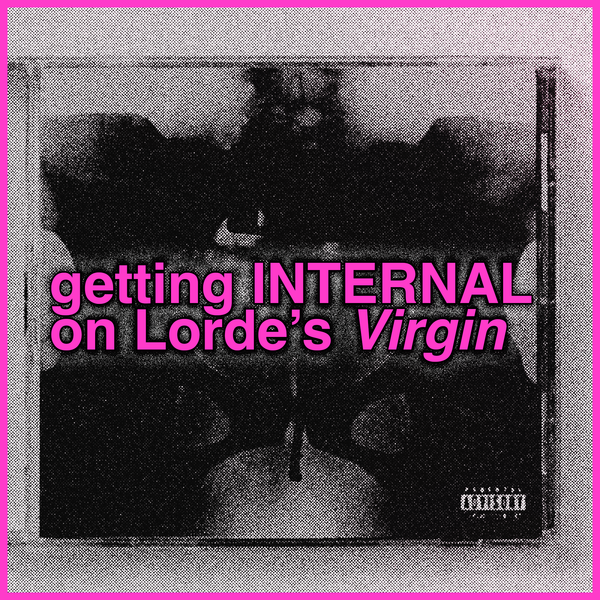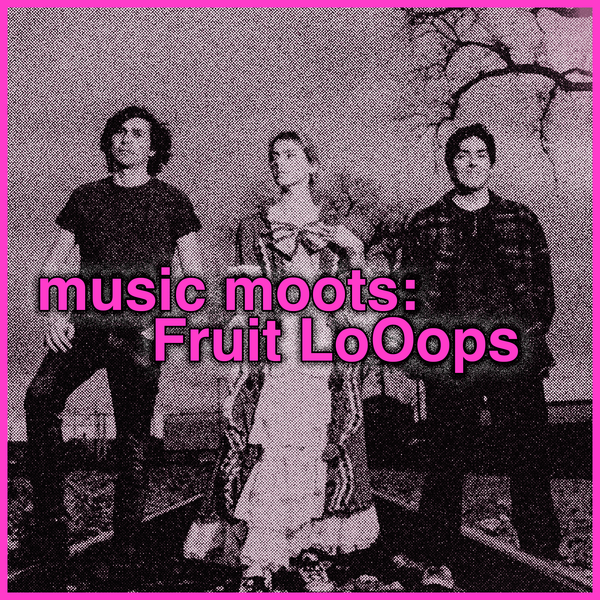The Music Enjoyer: Sweet Palma
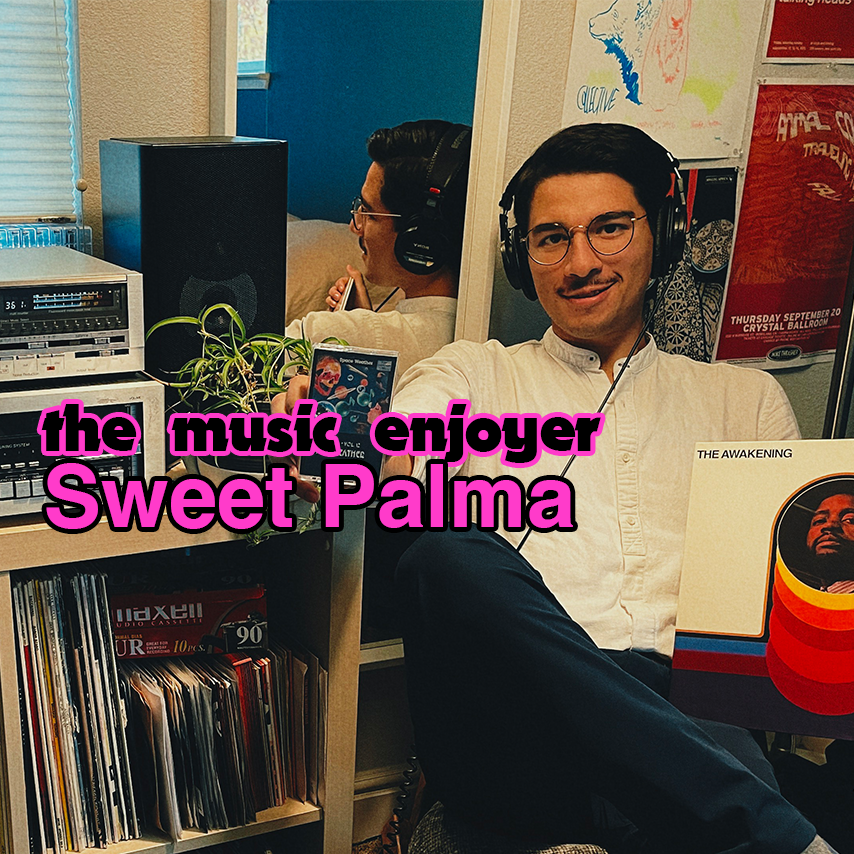
I Enjoy Music is a blog about enjoying music. If you have read the blog, you know I like tackling music enjoyment from many angles. I love asking musicians about their various music-making processes; I love going to see live shows and writing about the live show experience from the audience perspective; I love also digging into the logistics that go into supporting music scenes, or talking to music video directors, or people who are creating new types of music tech; I like watching movies about music and I like the music that accompanies movies.
Today's blog is a new type of blog, in which I ask someone — a Music Enjoyer — about their holistic musical habits: what they listened to growing up, ideal musical delivery mechanisms, and so forth. Every person on Earth is a potential Music Enjoyer, and every Music Enjoyer is unique in their practices.
Today's Enjoyer in question is Sweet Palma, who I first encountered online via his contributions to the chaotic hangout podcast Seeking Derangements. Sweet Palma has been creating eclectic and fantastic "Radio Palma" music mixes — published on Soundcloud, with themes like "Livin' Underwater" and "The Lush Interior," pulling together music from many different nations and time periods, all fully realized with cover art and lovingly timecoded track IDs — a Music Enjoyer's dream!
I emailed my music enjoyment-themed questions and was agog at the detailed responses. I can't wait for you to read this musical profile of Sweet Palma. It certainly inspired me to get more intentional and expansive with where I source my tunes.
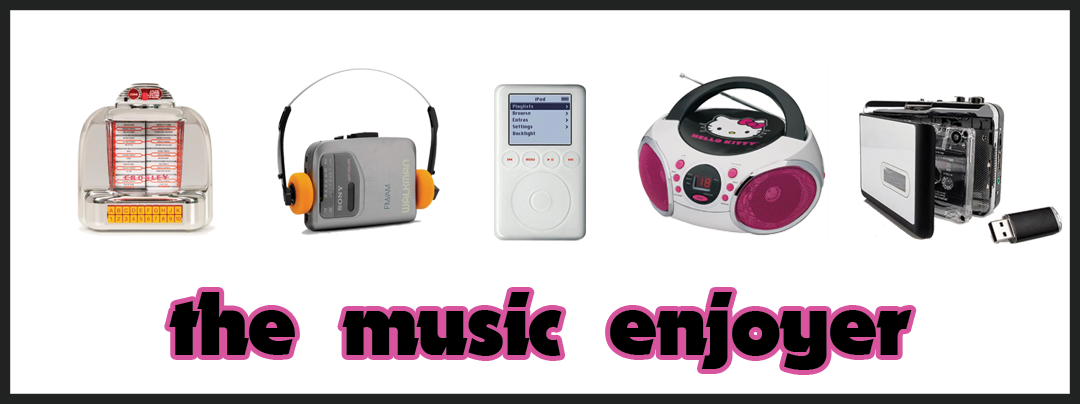
you may have received this post as an email. if so, congrats and thanks for signing up! i will send emails sometimes, but not too often. below is a sign-up button if you aren't subscribed, but would like to be...
What music did you listen to when you were a kid? A teenager? How has your taste developed over the years?
I distinctly remember my dad always having at least one Morrissey CD in the car at all times when we lived in El Salvador (as would be expected of any Latino of his generation). Most of the time it was Viva Hate, but once in a while he would bust out Bona Drag, which was my favorite of the two. My mom loved Bossa Nova, old Motown stuff — Jackson 5, Aretha, The Temptations, Smokey Robinson, that kind of vibe — and Paul Simon. Lots of Paul Simon: Simon and Garfunkel, Early Solo Simon, Late Solo Simon, the Simon + Garfunkel reunions... she had all of that on CD. When I was 5-6 I was obsessed with Bookends, which I still think is one of the best 30 minutes of recorded music of all time.
My grandpa, who lived across the street from us at the time, had a basement "music den" under his garage. He’d invite his musician friends over to have a drink and jam for a few hours, though I was too young to witness most of that myself. He’s an incredibly talented musician, who learned to play marimba, upright bass, guitar, piano, and percussion “by ear” (he still doesn’t know how to read music) when he was in juvenile detention in the late 1940s. His greatest love is Jazz (Oscar Peterson, Miles Davis’ early period, Dizzy Gillespie, Ahmad Jamal come to mind) and, to a slightly lesser extent, traditional marimba music. He’s my most important early influence, and taught me to appreciate the spontaneity of live performance, improvisation, and the feeling one can share through music.
My family moved from El Salvador to California when I was 10. My aunt had given me, as a going-away present, one of those SanDisk mp3 players with an FM receiver, which I quickly filled up with what my older brothers were listening to at the time. My straight brother was big on the mid-aughts British Invasion bands — The Fratellis and Franz Ferdinand. My gay brother was more into Destiny’s Child and Shakira ("Pies Descalzos" is undeniably her best bop of all time). I think my straight brother showed me The Blues Brothers Movie around that time, which made a HUGE impact on me. If there’s any “Rosetta Stone” to make sense of my taste in music, it’s that movie.
I recall first "getting into music” when I was 12 or 13 and discovering the 4chan’s music subforum (this must have been 2011 or 2012, before all of 4chan was taken over by the /pol/ board, but that’s quite another story). I never really rated a lot of the music they discussed (cough Kanye cough Neutral Milk Hotel), except for Animal Collective and Talking Heads. Looking back on it, it felt like a lot of the discourse around music online was immature and infantile. Your opinion didn’t matter unless you had the right scrobbles on Last.fm, and the only good “underground” albums were on the forum's introductory chart. None of it satisfied my curiosity. It seemed like the discussion began and ended at mu-core, and I wanted to know more about each album — the influences, the circumstances around it, the musicians, etc. About that time, I found my parents’ old record player which they had brought over from El Salvador, a Lenco L85 belt-driven monstrosity with mild speed issues. In time I would upgrade to some better equipment, but this was the genesis of my love of vinyl records and collecting them. I found and became a regular at the record stores in Sacramento, who all had a sterling selection of 60s-70s jazz — Blue Note, CTI, that sort of sound.
By the time I was in 10th grade, I branched out and started listening to Television, Fire Engines, Fela Kuti, King Sunny Ade, as well as expanding to other similar sounds. First to the Sound of New Scotland: Orange Juice, Aztec Camera, Josef K; then came West Africa: S.E. Rogie, early Fela, Analog Africa compilations, Soundway and Mr Bongo. I felt like CBGB’s and the Kalakuta Republic were super simpatico, that Fela could be as punk as Suicide, and that Tom Verlaine could be as groovy as any given Ghanaian dance band. By the time I finished High School, I had started investigating Bossa Nova and Brazilian pop as well (Os Mutantes, Milton Nascimento, Erasmo Carlos, Tim Maia). I hadn’t really cared for the slick and sanitized American take on Bossa Nova (Walter Wanderley, Astrud Gilberto, Deodato), but I felt like the Brazilian take on American funk, soul, jazz and disco was much more authentic and gritty. The Black movement of the late 70s, which inspired some of my favorite Brazilian music (Banda Black Rio, Banda União Black, Tim Maia, Jorge Ben, Marcos Valle), fused Tropicalist thinking with American music that was seen as emblematic of the Civil Rights movement of a few years prior: Sly Stone, yes, but also Les McCann and Nina Simone.
Around that time, I also managed to get an invite to what.cd (or maybe I passed an interview for one on IRC). It was a gold mine for me, especially when you consider that music streaming, though no longer a novelty, still had lackluster libraries (no Beatles!) and UX (remember when Spotify was shuffle-only?). Here was a vastly more complete, better-organized collection of music, which you could listen to any way you wanted, for free, in the highest quality one could ask for. I still miss it.
As the pandemic started in late Feb. 2020, two very important things happened to me. First, I bought myself a blotter-sheet of acid, intending to do some “self-exploration” during the lockdown. The second, which had a much larger impact on me, a friend of mine recommended I listen to the Grateful Dead’s Europe ’72 live album. I was immediately hooked, and sank deeper into Deadheadedness as the summer of 2020 continued. When I moved to Spain in late 2020, the Grateful Dead became a soothing balm for homesickness, and a welcome companion on walks, train rides, and psychedelic trips. I’m sure a lot of people will scoff at the idea of spending 3-4 hours listening to the same band, but the quantity and breadth of material meant that there is something new and unique about every show, every venue, every city, every tour, and that if one has the ears to listen, these qualities eventually come to the fore.
The community and culture that came with the Dead was also a big influence — the idea of freely trading tapes for “blanks and postage”, zines and proto-blogs, radical inclusivity, concerts as collaborative events, cassette culture, amateur audio engineering and acoustics, acid, pot and pills… that’s all part of my outlook now.
What is your favorite way to listen to music? (i.e. speakers, headphones, digital vs analog, etc.).
I’m generally agnostic about my music listening habits, and I won’t raise a fuss about listening to analog vs. digital, but I will admit that I love listening to tapes and records…not just because of the sound, but because they are something tangible, not to be ripped from my hands by a change in distribution or a lack of an internet connection. The larger packaging, being able to hold the music in your hands, that’s something very attractive about the format for me. Nowadays I like to be able to pop on a C-90 tape and forget about it for 90 minutes, without having to futz with my phone or a keyboard and mouse, or worry about ads, or having to subsidize some soul-less conglomerate; it’s quite freeing. Plus, they don’t sound so bad now that really premium equipment from back in the day sells for less than a quarter of the price on the used market. My hi-fi setup is pretty humble but I think it sounds bangin’.
Where do you find new (or new to you) music?
I used to follow this Nigerian music journalist, Uchenna Ikonne, who was quite the fixture in the blogging scene circa 2008-2012 and had an impressively deep knowledge of West African pop music. Now he writes books and liner notes for compilations (Who Is William Onyeabor?, Wake Up You! The Rise and Fall of Nigerian Rock). I also follow niche labels like Analog Africa, Soundway, etc., and some bootleggers like “Presch Media” who dug up wonderful old records and tunes. (This article [about Markus Presch] details more or less how a (White, European) Afropop DJ accused a label specializing in West African Funk bootlegs of being run by Neo-Nazis. Crazy shit, and not your regular online slapfight.) There were some vinyl dealers on what.cd and its successor, who would digitize all kinds of rare records as they passed through their hands, from collector to collector, sharing music that would otherwise be held quite close (following the DJ tradition of track ID secrecy). I would trawl Discogs, looking at the pages for records I liked and exploring the pages of the musicians involved. What.CD and its successors are also an invaluable resource, as are sites like dimeadozen.org, where concert recordings for all kinds of artists are uploaded. There’s a lot of fantastic live performances there that will never have seen the light of day without the foresight of the taping community.
How do you approach a Radio Palma mix — do you start with a theme, a particularly inspirational song, something else? How long does it take to curate, sequence, string everything together, finalize?
I have a long catch-all playlist on Spotify, Vibes Unlimited, where I dump all the tracks I like as I find them. A few times a month I’ll listen through the latest addition and try to find a theme to fit the tracks I like the most — music for a greasy spoon diner, music for ostensibly-formal dinner parties, music to freak out to. Naturally these “signature" tracks I’ve chosen don’t always flow perfectly from one to the other, but it’s not too hard to think of some other tune or track or recording that could fit that space between them.
My MO sort of takes after the Dead’s formula for a set: start with some shorter tracks to set the mood, then embark on the 20-30 minute jam. In their case, it’s spontaneously improvised, but in mine I have the benefit of non-linear audio editing, where I can dice and splice as I please, injecting a phrase or a quote from one piece into a longer one, or segueing from one movement to a completely unrelated one, and so on. I also try to keep the concept of tension-release in mind, so I sequence my tracks in the playlist to suit the vibe and so they flow more or less naturally. Not to say that this flow can’t be interrupted — where would the spontaneity be in that? — but these dissonant or dynamic moments still need to make sense within the broader themes.
Once I have about two hours’ worth of music I want to include in a tape, and have some notion of the order I want them in, I’ll sit down and put it together in Adobe Audition, EQ and compress the individual tracks to suit, and fiddle with the transitions, usually to so-so effect (though I think I’m getting better at that part now). I design the cover collage while I’m listening to a draft of the mix, because I want it to follow the same theme, or I want it to reference a particular moment in the tape, or my mood while I listen to it. I’ll go on any number of open-access photo libraries (Smithsonian, Cleveland Museum of Art, Art Institute of Chicago are all great resources) for materials, and come up with a title only at the very end (though sometimes it’ll be a phrase that springs to mind at some other point in the process). I make a point of uploading it in a lossless format, because I want people to have that option instead of relying on streaming quality. After all, I make an effort to source my tracks from high-quality sources, and want my listeners to have the same option.
Any particular mix of yours that you have a soft spot for, or feels like a "signature" mix?
I’ve been making mixes for a while, and felt like they were all worthy of being called the “best”… until I got to Vol. 12: Space Weather and its spiritual cousin, Vol. 16: A Greeting from New Mountain. I was living in Spain and made these mixes from music I listened to all the time with my boyfriend, who lived in an out-of-the-way area of Santander, a former rock quarry called Nueva Montaña — New Mountain. It recalls the feeling of raindrops softly landing on his window, watching the clouds race across the Sea of Cantabria in the distance, dark and heavy with rain. Now every time I pop one of them on, I feel like I’m back on the bus across town, headed to his place with a hot kebab in my hand, a brick of hash in my bag, and a Dead tape on my phone.
You've been making cassettes – what do you like about that particular format?
I like working while listening to music, but I’m also easily distracted. I used to spend like an hour of my time skipping through my playlists to get a track I could listen to while I do my homework, only to start the process anew once that track had ended, which in turn was another invitation to get lost in twitter, or YouTube, or whatever other timesink I could find on my phone or on the internet. I started making mixes in part to allow myself the privilege of listening to music without distraction, but I still had to go on my phone or computer to play the digital files. I decided that an analog format would probably be better, not just because of the distractions of digital life, but also because I wanted to share these mixes without feeling like a tool for asking people to “check out my Soundcloud”. I learned through listening to Grateful Dead bootlegs that cassette tapes can also sound really good, maybe as good as digital, while also adding this extra color that is so hard to emulate digitally.
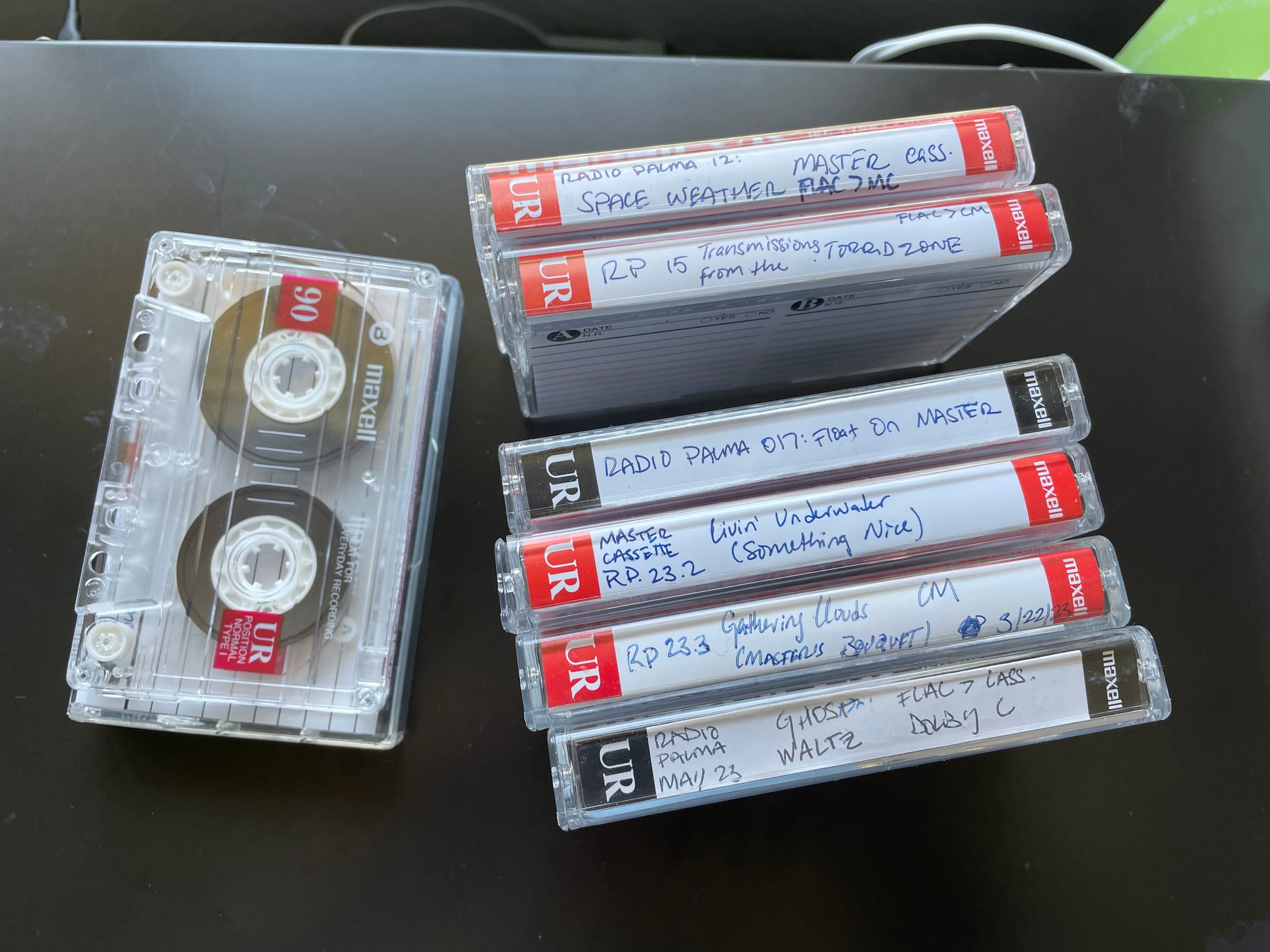
I’ve also put thought into the length of the tape. C-90 tapes are kind of the sweet spot for cassettes, because they pack a lot of play time without negatively impacting the quality of the tape itself; there are longer-duration tapes out there, like C-120s, but the tape in those is thinner and more prone to breaking due to size constraints; the shorter C-60s only give about 30 minutes of play time on each side of tape, which disrupts the flow of my mixes, and would keep me from including longer pieces of music or jams or what have you. 45 minutes a side on C90s give me enough time to emulate a run-of-the-mill set of live music, with its own tension-release cycle, and includes some breathing room to add music that reinforces the “vibe” of the tape.
I started making mixes before it occurred to me to dub them to tape. This is why many of my mixes prior to 2023 aren’t exactly 90 minutes; a few are just an hour, others are two hours, a couple even blow past the 3-hour mark. Some (by chance) will comfortably fit on a C-90, but quite a few were assembled and curated before I decided on structuring the mixes around the 90-minute format. It’s really bitten me in the ass now that I bought a stock of 150 blanks, all 90 minutes long!
I understand that as part of producing Seeking Derangements, you add music to the episodes. Do you have a strategy for how you incorporate the music? And do you hope, when you curate music for it, that you get that classic "what song is playing at [particular time] in the episode?" commentary from listeners?
As for my music for Seeking Derangements, the music is just a technical convention, a technique to paper over a cut in recording as we move from one topic to the next. These were quite frequent in the beginning of our career, our segues were awkward and we didn’t always have something lined up to talk about once a particular subject. I decided that I would use something from my collection of Library Music, interstitial tracks composed in bulk at music publishing houses in London, New York, Los Angeles, Paris and Rome, for pornographic films, mid-brow erotica, abstract ambient noodling or midly-rockin’ tunes that were more or less made to exist in the space between conversation topics or sex scenes or news segments. It seemed like a natural thing to do, putting them on the podcast. For intros I try to keep it short, about 30 seconds — the fans may like the music, but let’s not forget they’re here for the podcast. If they were just here for the music, more of them would be listening to my mixes! I usually let outro tracks go for a little longer, and try to use something where the intro will fit the final words of the show in terms of energy, theme and/or length, and I’ll let them run for about twice as long as the intro, but I leave it longer (or even unclipped!) if the music’s really good.
I love the interest people show in the music I share, and the way I share it. I find it very flattering. “What song did you use at such-and-such timestamp?” is just part of my life now, to the point where I must pre-empt it by sharing the track IDs in the show description, and try to upload the music to YouTube or something if I can’t find them online aside from whatever esoteric web-1.5 forum I managed to get the files from. You should not have to crawl on your hands and knees and go spelunking, so to speak, for these treasures like I have to. You should be able to play it all the time. And loud.
